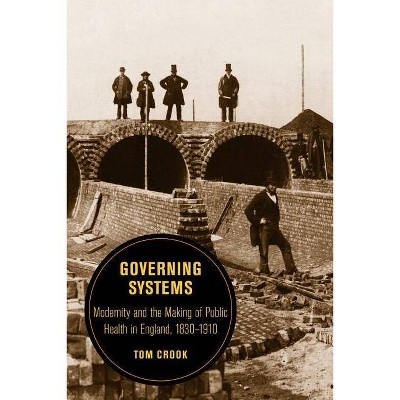Serving a Wired World, 17 - (Berkeley British Studies) by Katie Hindmarch-Watson (Hardcover)

Similar Products
Products of same category from the store
AllProduct info
<p/><br></br><p><b> About the Book </b></p></br></br>"In the public imagination, Silicon Valley embodies the newest of the new--the cutting edge, the forefront of our social networks and our globally interconnected lives. But the pressures exerted on many of today's communications tech workers mirror those of a much earlier generation of laborers in a very different space: the London work force that helped launch and shape the massive telecommunications systems operating at the turn of the twentieth century. As the Victorian age ended, affluent Britons came to rely on the telegraph for seamless communication: an efficient and impersonal mode of sharing thoughts, demands, and desires. This embrace of seemingly unmediated communication obscured the labor involved in the smooth operation of the network, much as our reliance on social media and app interfaces does today. Serving a Wired World is a history of information service work embedded in the daily maintenance of liberal Britain and the status quo in the early years of the twentieth century. As Katie Hindmarch-Watson shows, the administrators and engineers who crafted these telecommunications systems created networks according to conventional gender perceptions and social hierarchies, modeling the operation of the networks on the dynamic between master and servant. Despite attempts to render telegraphists and telephone operators invisible, these workers were quite aware of their crucial role in modern life, and they posed creative challenges to their marginalized status--from organizing labor strikes to participating in deviant sexual exchanges. In unexpected ways, these workers turned a flatly neutral telecommunications network into a revolutionary one, challenging the status quo in ways familiar today"--<p/><br></br><p><b> Book Synopsis </b></p></br></br>In the public imagination, Silicon Valley embodies the newest of the new--the cutting edge, the forefront of our social networks and our globally interconnected lives. But the pressures exerted on many of today's communications tech workers mirror those of a much earlier generation of laborers in a very different space: the London workforce that helped launch and shape the massive telecommunications systems operating at the turn of the twentieth century. As the Victorian age ended, affluent Britons came to rely on information exchanged along telegraph and telephone wires for seamless communication: an efficient and impersonal mode of sharing thoughts, demands, and desires. This embrace of seemingly unmediated communication obscured the labor involved in the smooth operation of the network, much as our reliance on social media and app interfaces does today. <p/><i>Serving a Wired World</i> is a history of information service work embedded in the daily maintenance of liberal Britain and the status quo in the early years of the twentieth century. As Katie Hindmarch-Watson shows, the administrators and engineers who crafted these telecommunications systems created networks according to conventional gender perceptions and social hierarchies, modeling the operation of the networks on the dynamic between master and servant. Despite attempts to render telegraphists and telephone operators invisible, these workers were quite aware of their crucial role in modern life, and they posed creative challenges to their marginalized status--from organizing labor strikes to participating in deviant sexual exchanges. In unexpected ways, these workers turned a flatly neutral telecommunications network into a revolutionary one, challenging the status quo in ways familiar today. <p/><p/><br></br><p><b> From the Back Cover </b></p></br></br>"Katie Hindmarch-Watson has delivered a gem: a history that is deeply specific yet urgently relevant to our present technological moment. In our current context of a networked world that runs on invisible and exploited labor, this story of the forgotten workers who ran London's telegraph network is more relevant than ever before. This book will be required reading for courses on the history of the internet and the history of sexuality, gender, and technology."--Mar Hicks, author of <i>Programmed Inequality: How Britain Discarded Women Technologists and Lost Its Edge in Computing</i> <p/> "Full of strangeness, rich detail, and wonderfully oddball material, <i>Serving a Wired World</i> is an engrossing and inventive work. With sophisticated analysis and a raft of original research, it is an exceptional study of the intersection of information systems and political orders."--Chris Otter, author of <i>The Victorian Eye: A Political History of Light and Vision in Britain, 1800-1910</i> <p/> "This brilliant book is the cutting edge of a new wave of scholarship on class and labor. With detailed and original stories of labor, gender, sexuality, and surveillance, Hindmarch-Watson offers a fresh and necessary understanding of class that shifts our understanding of the nineteenth century--and illuminates transformations in information technology and labor processes for all societies."--Anna Clark, author of <i>Alternative Histories of the Self: A Cultural History of Sexuality and Secrets, 1762-1917</i> <p/> "Innovative and imaginative, <i>Serving a Wired World</i> is a pathbreaking work. Expansive in scope and meticulously attentive to complexity, this is a major scholarly contribution to the history of Britain's liberal modernity, deftly relating a complex story of urban space, social class, sexuality, and the practices of the modern telecommunications industry."--Chris Waters, author of <i>British Socialists and the Politics of Popular Culture, 1884-1914</i><p/><br></br><p><b> Review Quotes </b></p></br></br><br>"<i>Serving a Wired World</i> juxtaposes in colorful ways the varied tensions of the period: between administrators and workers, privacy and mediation, female and male employees, good boys and bad ones, order and rebellion. . . . Today's information workers may recognize some of these tensions, particularly in how library labor is both integral and invisibilized in library operations and how administrative decisions inform public discourse on the labor of information."-- "College & Research Libraries"<br><p/><br></br><p><b> About the Author </b></p></br></br><b>Katie Hindmarch-Watson</b> is Assistant Professor of Modern British History at Johns Hopkins University.
Price History
Price Archive shows prices from various stores, lets you see history and find the cheapest. There is no actual sale on the website. For all support, inquiry and suggestion messagescommunication@pricearchive.us




















